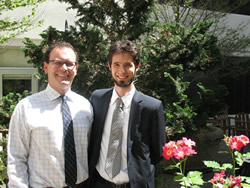AB 551 would set the table for new resources for fresh food

Nik Reed, board member, The Greenhouse Project and COO, Ravel Law Inc. and Eli Zigas, food systems and urban agriculture program manager, San Francisco Planning and Urban Research Association (SPUR) in Sacramento to testify to the Assembly Committee on Local Government on behalf of AB 551.
“We want to encourage small farms on vacant and blighted inner-city properties and make it easier for them to flourish,” Ting said. “By creating a tax incentive for property owners to dedicate the property for urban farming, we are offering them a creative option for their unused land, and providing the community a new source of locally grown, fresh food.”
AB 551 is sponsored by San Francisco Urban Agriculture Alliance, and has the support of San Francisco Supervisor David Chiu, Little City Gardens, San Francisco Planning and Urban Research Association (SPUR), Mission Pie, and dozens of community-based farming organizations throughout the state. AB 551 addresses one of the main obstacles these organizations face in accessing land to farm in urban areas — a potential jump in property assessment — that makes it financially infeasible for a landowner to allow farming on the property.
“The pleasures of locally grown, fresh food can help build communities and positively contribute to unique cultures and regional diversity,” Ting said after the committee voted 5 – 0 in favor of his legislation. “This legislation is a win for property owners and a win for those living near blighted property that is a magnet for graffiti, trash and crime,” Ting added.
AB 551 is modeled after the Williamson Act – a landmark state law enacted in 1965 that is credited with preserving millions of acres of agricultural land that would otherwise have been lost to development. Like the Williamson Act, AB 551 would allow a county or city to enter into a contract with a landowner within an urban agriculture incentive zone. The landowner would restrict the use of a contracted property to urban agriculture purposes for the period of the contract. Under the contract, the county or city would assess the value of the property at a lower rate, creating a tax incentive for the landowner to set the property for urban agricultural use.
“I see the urban agriculture movement as a strong link that brings a closer connection between people and the food we eat. I believe it is important for the state to find ways, like AB 551, to cultivate this activity,” Ting said. “Slow-local food tastes better, it's healthier for you, and it's better for the environment. When I see these types of gardens sprouting up throughout the city I am inspired by them, and am committed to helping expand this movement.”
Assemblymember Ting is the Chair of Assembly Democratic Caucus and the Assembly Select Committee on Asia/California Trade and Investment Promotion, and he serves on the Budget, Business, Professions and Consumer Protection, Environmental Safety and Toxic Materials and the Revenue and Taxation committees.
AB 551 next will be considered by the Assembly Appropriations Committee.
CONTACT: Carol Chamberlain, carol.chamberlain@asm.ca.gov, office: 916-319-2019, cell: 916-804-5355